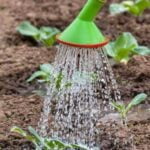A weed killer safe for vegetable gardens is essential for maintaining a healthy and thriving garden. This section will provide an introduction to the topic, discussing the significance of using a weed killer that is specifically designed for vegetable gardens.
Vegetable gardens are susceptible to weed infestations, which can compete with plants for nutrients, sunlight, and water. Additionally, weeds may harbor pests or diseases that can harm the vegetables. Therefore, it is crucial to have an effective weed killer that does not pose any risks or dangers to the vegetables themselves.
Traditional weed killers often contain chemicals that can be harmful if they come into contact with edible crops. These chemicals can leach into the soil and ultimately be absorbed by the vegetables, compromising their quality and safety for consumption. As a result, it is best to avoid using traditional weed killers in vegetable gardens.
In order to ensure the safety of your vegetable garden, it is important to understand the essential elements of a safe weed killer. This includes considering factors such as ingredients, application methods, and potential effects on the environment. By selecting a weed killer specifically formulated for vegetable gardens, you can effectively eliminate weeds while safeguarding your crops.
Why Traditional Weed Killers Should Be Avoided
Traditional weed killers, also known as chemical herbicides, should be avoided in vegetable gardens due to the risks and dangers they pose. These products contain synthetic chemicals that can have negative impacts on both the environment and human health.
One of the main reasons to avoid traditional weed killers in vegetable gardens is that these chemicals can contaminate the soil and water. When chemical herbicides are applied to weeds, they can seep into the soil and leach into groundwater sources, potentially harming beneficial organisms and plants in the process. In addition, these chemicals can run off from the garden during rainfall or irrigation, polluting nearby water bodies such as streams, rivers, and lakes.
Furthermore, traditional weed killers can also pose risks to human health. Exposure to these chemicals through skin contact or inhalation can lead to various health issues, including skin irritations, respiratory problems, and even long-term effects such as cancer. This is particularly concerning in vegetable gardens where people often come into direct contact with the plants during planting, watering, or harvesting.
| Environmental Impact | Health Risks |
|---|---|
| Contamination of soil and water sources | Skin irritations |
| Pollution of nearby water bodies | Respiratory problems |
| Harm to beneficial organisms and plants | Potential long-term effects such as cancer |
Given these risks and dangers associated with traditional weed killers, it is crucial for gardeners to explore safer alternatives for controlling weeds in their vegetable gardens. The next sections of this article will focus on the essential elements of a safe weed killer, natural and homemade options, as well as tips for selecting the right product for specific vegetable gardens.
By using these alternatives and following best practices, gardeners can ensure that their vegetable gardens thrive without compromising their health or the environment.
The Essential Elements of a Safe Weed Killer for Vegetable Gardens
When it comes to selecting a weed killer for your vegetable garden, it is crucial to prioritize the safety of both your plants and yourself. Traditional weed killers often contain harmful chemicals that can have adverse effects on the growth and health of your vegetables. Therefore, understanding the essential elements of a safe weed killer for vegetable gardens is vital to ensure that you are making a responsible choice.
Selectivity and Targeted Action
One of the key elements to consider when choosing a weed killer for vegetable gardens is selectivity. You want a product that specifically targets weeds while leaving your vegetables unharmed. This selectivity ensures that your weed killer tackles unwanted plants without compromising the health or productivity of your garden.
Organic and Natural Ingredients
Opting for organic and natural ingredients in your weed killer is another crucial factor to consider. These alternatives prioritize environmental sustainability and reduce the potential risks associated with chemical exposure. Look for herbicides labeled as organic or made from naturally derived plant-based ingredients, as they are typically safe for use in vegetable gardens.
Rapid Breakdown and Limited Residue
A safe weed killer should break down quickly in the environment, minimizing any residue left behind after application. This feature prevents potential contamination and ensures that your vegetables remain free from any harmful residues. Read product labels carefully to ensure that the weed killer you choose breaks down rapidly, promoting a healthy growing environment for your vegetables.
By considering these three essential elements – selectivity, organic ingredients, and rapid breakdown – you can make an informed decision when selecting a safe weed killer for your vegetable garden. Implementing these factors will help safeguard both your crops and the environment from potential harm while effectively controlling weeds in your garden bed. Remember, always follow application instructions carefully to ensure maximum safety and efficacy when using any type of weed killer in your vegetable garden.
Natural Weed Killer Options for Vegetable Gardens
Understanding the Need for Eco-Friendly Weed Killers
Vegetable gardens are often highly valued for their ability to provide fresh, healthy produce. However, traditional weed killers pose significant risks to these gardens and the people who consume their crops. The chemicals in these products can seep into the soil, contaminate vegetables, and harm both humans and the environment.
As a result, many gardeners are seeking alternatives that are effective in controlling weeds while remaining safe for vegetable gardens. This section will discuss some natural weed killer options that can help maintain a thriving and eco-friendly vegetable garden.
Organic Herbicides: A Safe Option for Weed Control
Organic herbicides offer a safer alternative to traditional weed killers as they are made from natural ingredients. These products use substances like vinegar, citric acid, and essential oils to kill unwanted weeds without harming vegetable plants. Vinegar-based herbicides work by disrupting the cell membranes of plants, resulting in dehydration and ultimately killing them.
Another organic option is corn gluten meal, which acts as a pre-emergent weed control method. When applied at the right time before seeds germinate, it helps prevent weed growth by inhibiting root development. Additionally, essential oil-based herbicides derived from substances like clove oil or citrus oil can effectively kill weeds while leaving vegetable plants unharmed.
Natural Weed Control Methods
Beyond using organic herbicides, there are several other eco-friendly methods available for weed control in vegetable gardens. One popular technique is mulching with organic materials like straw or wood chips. Mulch acts as a physical barrier that prevents weeds from receiving sunlight and thus inhibits their growth.
Hand-pulling weeds is another effective method when done regularly and carefully. It’s important to ensure that all parts of the weeds, including roots, are removed to prevent regrowth. Additionally, solarization, a technique that involves covering the soil with clear plastic to trap heat and kill weed seeds and seedlings, can be used in areas where no vegetable plants are present.
By exploring these natural weed killer options and control methods, gardeners can effectively combat weeds while safeguarding their vegetable gardens from harmful chemicals. It is essential to choose the option that best suits your specific garden’s needs and conditions. As a responsible gardener, it’s crucial to prioritize eco-friendly alternatives for long-term sustainability.
Homemade Weed Killer Recipes for Vegetable Gardens
One of the most important aspects of maintaining a healthy vegetable garden is effectively controlling weeds. Weeds compete with your vegetables for nutrients, water, and sunlight, leading to stunted growth and reduced harvest yields. While there are many commercial weed killers available on the market, some gardeners prefer to use homemade solutions that are safe for their vegetable gardens. In this section, we will explore some DIY weed killer recipes that can effectively control weeds without harming your precious vegetables.
- Vinegar-Based Weed Killer: One popular homemade weed killer recipe uses vinegar as its main ingredient. To make this solution, mix one gallon of white distilled vinegar with one cup of table salt and one tablespoon of dish soap. Pour the mixture into a spray bottle and apply it directly on the leaves of unwanted weeds. The acetic acid in vinegar works by drying out and killing the plants.
- Saltwater Spray: Another easy-to-make DIY weed killer for vegetable gardens is a simple saltwater spray. Dissolve one cup of table salt in two cups of warm water and pour it into a spray bottle. Spray this solution directly onto the weeds, ensuring that you avoid hitting your vegetables. The high concentration of salt dehydrates the plants and prevents them from absorbing water effectively.
- Boiling Water: If you prefer an even simpler approach, boiling water can be an effective weed killer for certain types of weeds. Simply bring a pot of water to boil and carefully pour it over the unwanted weeds in your garden bed or between rows of vegetables. The high temperature scalds the plant tissues, causing them to wither and die.
It’s important to note that while these homemade weed killer recipes are safe for vegetable gardens when used appropriately, they should still be applied with caution. Take care not to accidentally spray or pour the solution onto your desired plants as it may cause damage or kill them.
Additionally, keep in mind that these natural remedies may not be as potent or long-lasting as commercial weed killers, so regular monitoring and repeated applications may be necessary for effective weed control.
| Homemade Weed Killer Recipe | Main Ingredients | Application Method |
|---|---|---|
| Vinegar-Based Weed Killer | White distilled vinegar, table salt, dish soap | Spray directly on leaves of weeds |
| Saltwater Spray | Table salt, warm water | Spray directly on weeds, avoiding contact with vegetables |
| Boiling Water | Water (boiled) | Pour over weeds, avoiding contact with vegetables |
Choosing the Right Weed Killer for Your Specific Vegetable Garden
Understanding the Needs of Your Vegetable Garden
Before selecting a weed killer for your vegetable garden, it is important to understand the specific needs and characteristics of your garden. Consider factors such as the types of vegetables you are growing, the stage of growth they are in, and any existing weed problems you are facing. Different vegetable plants have different tolerances to certain herbicides, so it is crucial to choose a weed killer that will be effective without harming your vegetables.
Identifying and Targeting Weeds
To effectively control weeds in your vegetable garden, it is important to identify the types of weeds you are dealing with. Certain herbicides are specifically designed to target broadleaf weeds while sparing grassy weeds, while others may be effective against both types. Take note of any persistent or invasive weeds in your garden and choose a weed killer that targets them directly.
Considering Safety and Environmental Impact
When selecting a weed killer for your vegetable garden, always prioritize safety and environmental impact. Look for products that are labeled as safe for use around edible plants and follow all instructions and precautions provided by the manufacturer. Organic or natural options should be considered if you want to minimize chemical exposure and potential harm to beneficial insects or wildlife in your garden.
It is also worth noting that some herbicides can persist in the soil for extended periods of time, which may affect future plantings. To avoid any adverse effects on future crops, consider using a pre-emergent herbicide that prevents weed seeds from germinating rather than one that resides in the soil for an extended duration.
By taking these factors into consideration when choosing a weed killer for your specific vegetable garden, you can ensure effective weed control without compromising the health and productivity of your plants.
Tips and Best Practices for Using Weed Killers in Vegetable Gardens
When it comes to using weed killers in vegetable gardens, it is important to follow certain tips and best practices to ensure the safety of your plants and the effectiveness of the weed killer. Here are some dos and don’ts to keep in mind:
Dos:
- Read and follow the instructions: Before using any weed killer, carefully read the label and follow the instructions provided by the manufacturer. This will ensure that you are using the product correctly and safely.
- Choose a selective weed killer: Selective weed killers target specific types of weeds while leaving your vegetable plants unharmed. Look for products that specifically mention their compatibility with vegetable gardens.
- Apply at the right time: Apply the weed killer during a calm day, when there is no wind or rain forecasted for at least 24 hours. This will prevent drift or runoff that could damage your vegetable plants or contaminate surrounding areas.
- Protect yourself: Wear appropriate protective gear such as gloves, long sleeves, pants, closed-toe shoes, and goggles when handling or spraying weed killers. Avoid contact with your skin or eyes, as some products can be harmful if absorbed through these areas.
Don’ts:
- Overspray or apply excessively: Use only the recommended amount of weed killer according to the instructions on the label. Applying more than necessary can harm your vegetable plants and increase the risk of contamination.
- Spray near edible parts of vegetables: Be careful not to spray near or directly onto edible parts of your vegetables, such as leaves, stems, or fruits. This can result in chemical residue on your produce, making it unsafe for consumption.
- Use near water sources: Avoid using weed killers near ponds, streams, wells, or any other water sources in your garden. Some herbicides can contaminate water supplies and have harmful effects on aquatic life.
- Dispose of leftover weed killer properly: Follow the instructions on the label for proper disposal of any unused or leftover weed killer. Do not pour it down drains or dispose of it with regular household waste, as this can harm the environment.
By following these tips and best practices, you can effectively use weed killers in your vegetable garden while minimizing risks to your plants, yourself, and the environment. Remember to always choose a weed killer that is specifically labeled safe for vegetable gardens and consult a professional or expert if you have any doubts or concerns.
Review of the Top Weed Killers Safe for Vegetable Gardens
When it comes to keeping your vegetable garden free of weeds, choosing the right weed killer is crucial. In this section, we will review some of the top weed killers in the market that are safe for vegetable gardens. Whether you prefer organic options or commercially available products, there are choices that can effectively control weeds without harming your vegetables.
1. Organic Weed Killers:
– Vinegar: A natural weed killer that contains acetic acid and is known for its effectiveness against broadleaf weeds. You can make a homemade vinegar weed killer by combining vinegar, dish soap, and water.
– Corn gluten meal: This organic herbicide works by preventing weed seeds from germinating. It is a great option for preventing annual weeds from growing in your vegetable garden.
– Boiling water: An easy and environmentally friendly option is pouring boiling water over weeds. This method effectively kills many weeds by destroying their cell structure.
2. Commercially Available Options:
– Pre-emergent herbicides: These herbicides prevent weed seeds from sprouting and are safe to use around established vegetable plants.
– Selective herbicides: These herbicides target specific types of weeds without harming vegetables. It’s important to read the product labels carefully and ensure they are safe for your particular vegetable crops.
– Contact herbicides: These weed killers kill weeds on contact by damaging their leaves or stems. They can be an effective option for spot treatments in between rows of vegetables.
Remember, regardless of the type of weed killer you choose, always follow the instructions on the label carefully. It’s important to apply these products correctly to ensure the safety and health of your vegetable plants.
Case Studies and Success Stories
Real-life experiences and case studies can provide valuable insights into the effectiveness and safety of weed killers in vegetable gardens. By learning from others who have used various weed killer options, gardeners can make informed decisions about which products to choose and how to use them effectively. Here are a few case studies and success stories that highlight the experiences of gardeners who have successfully used weed killers in their vegetable gardens.
- Case Study: Sarah’s Organic Vegetable Garden Sarah had a thriving organic vegetable garden, but weeds started to take over her beds and compete with her crops for nutrients and sunlight. Concerned about using chemical-based weed killers, she decided to try an organic option. After conducting extensive research, she chose a vinegar-based weed killer recipe that consisted of white vinegar, salt, and dish soap.
She applied the mixture directly on the weeds, being careful not to get it on her vegetables. Sarah was pleasantly surprised by the results – within a few days, the weeds wilted away, leaving her vegetable garden weed-free and unharmed. - Success Story: Michael’s Experience with Commercial Weed Killers Michael had been struggling with persistent perennial weeds in his vegetable garden for years. Determined to find an effective solution, he turned to commercial weed killers specifically designed for use in edible gardens. After reading positive reviews online, he decided to give one of these products a try.
Following the instructions carefully, he applied the weed killer directly on the weeds while making sure not to spray it on his vegetables. To his delight, the stubborn weeds gradually died off without causing any harm to his beloved plants. Michael’s success story demonstrates that when used correctly, commercial weed killers can effectively eliminate weeds without jeopardizing the health of your vegetable garden. - Case Study: Lisa’s Eco-Friendly Herbicide Experiment Lisa was committed to maintaining an eco-friendly garden and was determined to find a natural herbicide that would be safe for her vegetable garden. She decided to experiment with corn gluten meal, a natural pre-emergent herbicide that inhibits weed seed germination. Lisa applied the corn gluten meal in early spring before the weed seeds could sprout.
Over time, she noticed a significant reduction in the number of weeds growing in her garden beds. Although it required patience and multiple applications, Lisa’s case study demonstrates that natural alternatives like corn gluten meal can be effective at preventing weed growth without harming vegetables.
These case studies and success stories underline the importance of choosing the right weed killer for your specific vegetable garden. Whether you opt for organic recipes or commercial products, proper application techniques are crucial to safeguarding your plants while effectively eliminating unwanted weeds. By learning from others’ experiences, gardeners can make informed decisions about which weed killers to use, increasing their chances of achieving a healthy and weed-free vegetable garden.
Frequently Asked Questions (FAQs) About Weed Killers for Vegetable Gardens
As gardeners, we understand the importance of maintaining a healthy and weed-free vegetable garden. However, choosing the right weed killer can be a daunting task, especially with the wide range of options available in the market. In this section, we will address some common questions and provide clear answers to help you make an informed decision.
- Can I use any weed killer in my vegetable garden?
- What should I consider when choosing a safe weed killer for my vegetable garden?
- Are there any natural alternatives to conventional weed killers?
- Can I make my own homemade weed killer recipe?
- How do I ensure the proper application of a weed killer in my vegetable garden?
Not all weed killers are safe to use in vegetable gardens. Conventional weed killers often contain harmful chemicals that can contaminate vegetables and pose risks to human health. It is crucial to choose a weed killer specifically labeled for use in vegetable gardens or opt for natural and organic alternatives.
When selecting a safe weed killer for your vegetable garden, it is essential to consider factors such as ingredients, toxicity levels, and application methods. Look for products that are certified organic, non-toxic, and biodegradable. Additionally, choose a weed killer that targets weeds specifically without harming your vegetable plants.
Yes. For those looking for eco-friendly alternatives, there are several natural options available. Vinegar-based solutions like white vinegar or apple cider vinegar can be effective at killing weeds by disrupting their cell structure. Boiling water can also be used to kill weeds by scalding them.
Certainly. There are many DIY recipes for homemade weed killers that you can try. One popular recipe includes mixing equal parts of vinegar and water with a few drops of dish soap. This solution can be sprayed directly on the unwanted weeds.
To ensure the safe and effective use of weed killers in your vegetable garden, always read and follow the instructions provided by the manufacturer. Take extra care to avoid overspray or direct contact with your vegetable plants. It is also advisable to apply weed killers on a dry and windless day to prevent drift.
To summarize, choosing a safe weed killer for your vegetable garden is crucial to protect both your crops and your health. By considering factors such as ingredients, toxicity levels, and application methods, you can make an informed decision. Whether you opt for natural alternatives or homemade recipes, always prioritize the safety of your vegetable garden. Remember to carefully follow instructions and best practices when using any weed killer in your garden.
Conclusion
In conclusion, a safe weed killer is essential for maintaining a healthy and weed-free vegetable garden. Traditional weed killers pose significant risks and dangers to vegetable gardens, as they can contaminate the soil and harm both plants and humans. It is crucial to consider the essential elements of a safe weed killer when selecting one for your vegetable garden.
One option is to explore eco-friendly alternatives that use natural ingredients as weed killers. These options are not only safe for vegetable gardens but also environmentally friendly. Homemade weed killer recipes can also be effective in controlling weeds without harming your vegetables. By using ingredients commonly found at home, you can create DIY solutions that are both cost-effective and safe.
When choosing a weed killer for your specific vegetable garden, it is important to consider factors such as the type of weeds present, the size of your garden, and any specific requirements or sensitivities of your vegetables. By selecting the right weed killer for your garden’s unique needs, you can effectively target unwanted weeds without causing harm to your plants or compromising their growth.
By following tips and best practices for using weed killers in vegetable gardens-such as choosing the appropriate application method, timing, and dosage-you can ensure maximum effectiveness while minimizing risks. It is important to always follow label instructions and take proper precautions to protect yourself, the environment, and the health of your plants.
To aid in your decision-making process, refer to reviews of top weed killers that are safe for vegetable gardens. Real-life case studies and success stories from fellow gardeners can provide valuable insights into their experiences with specific weed killers. Additionally, frequently asked questions (FAQs) offer clear answers to common queries about using weed killers in vegetable gardens.

If you’re looking to get into vegetable gardening, or are just looking for some tips on how to make your current garden better, then you’ve come to the right place! My name is Ethel and I have been gardening for years. In this blog, I’m going to share with you some of my best tips on how to create a successful vegetable garden.





